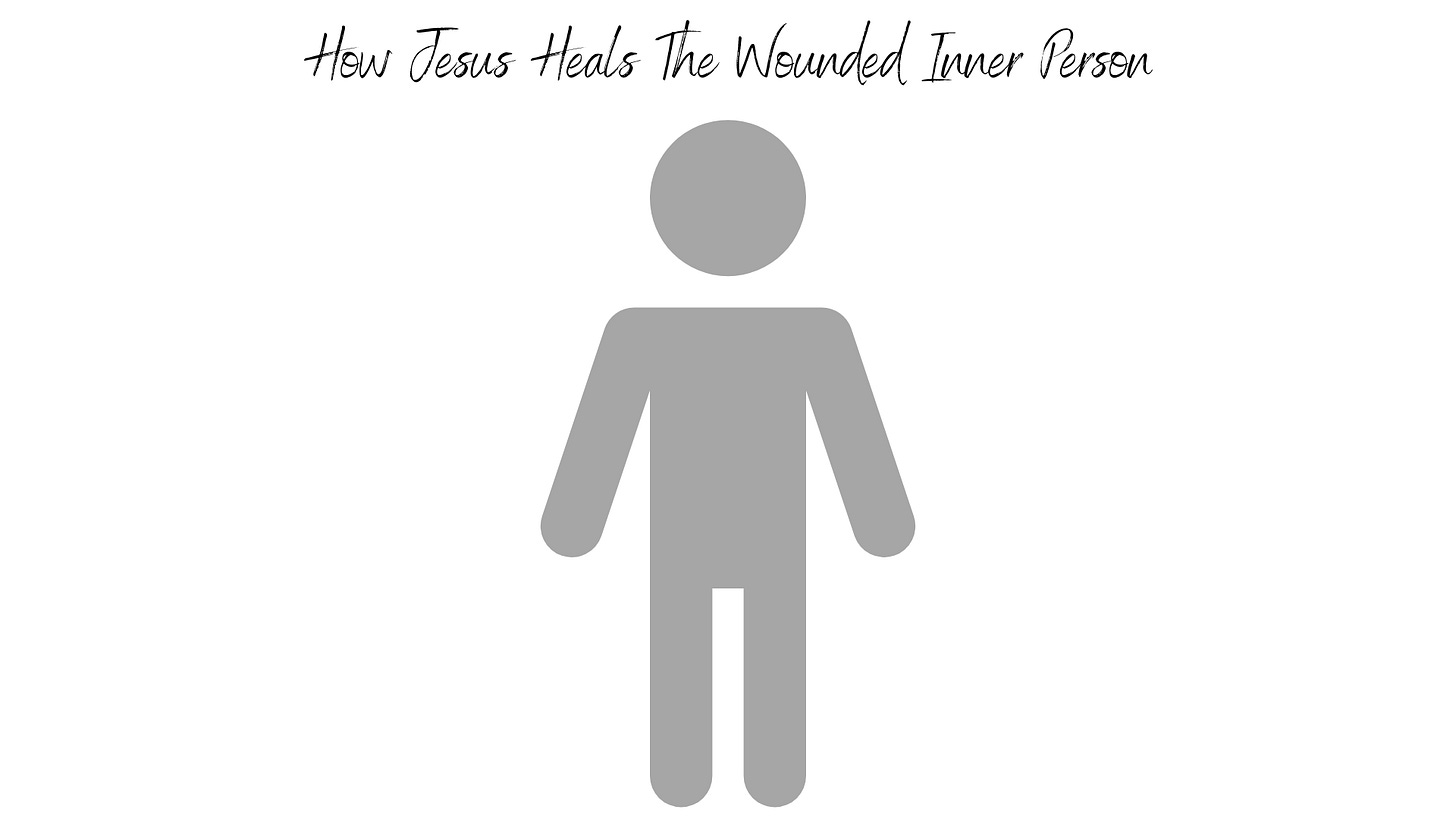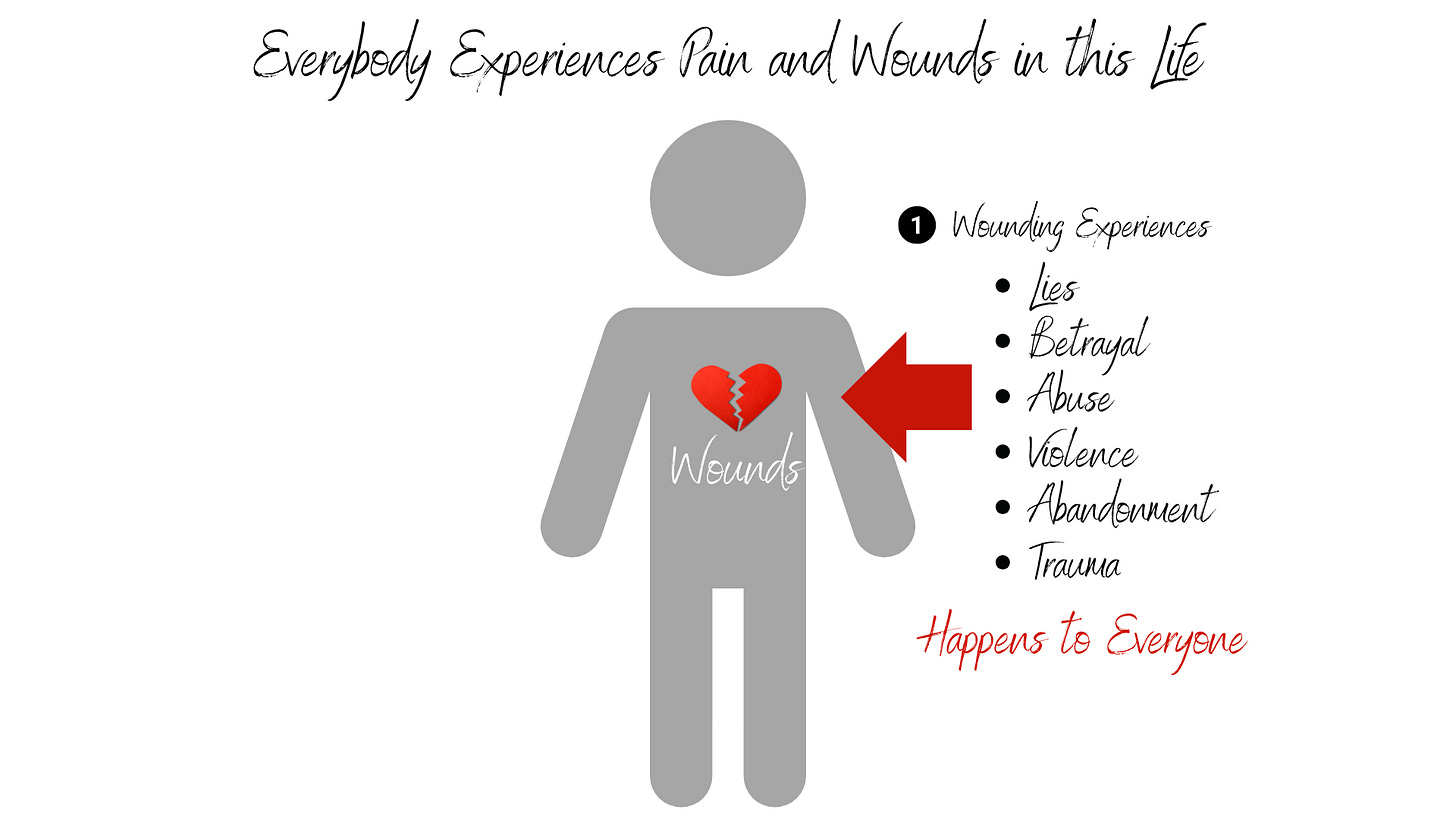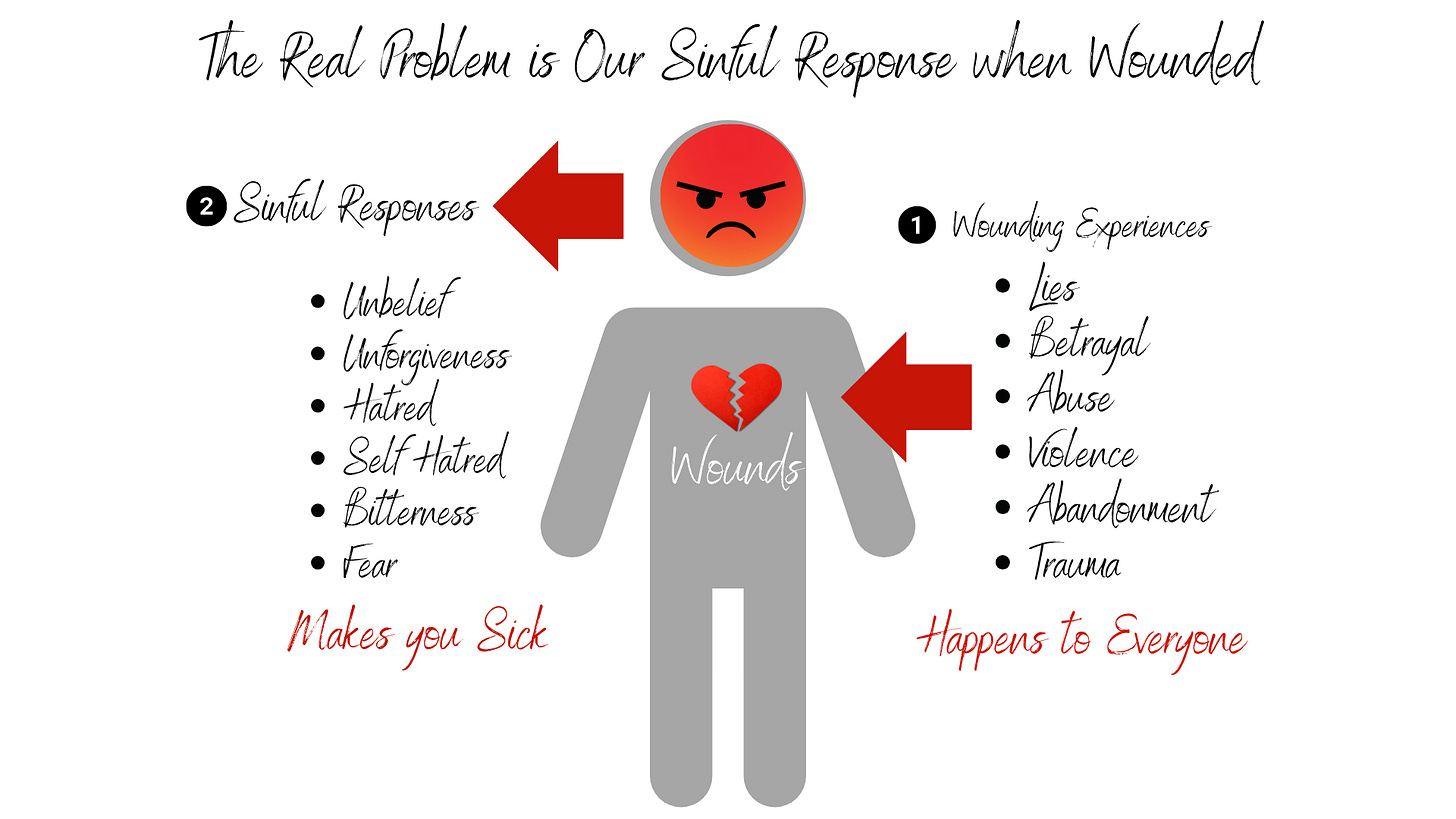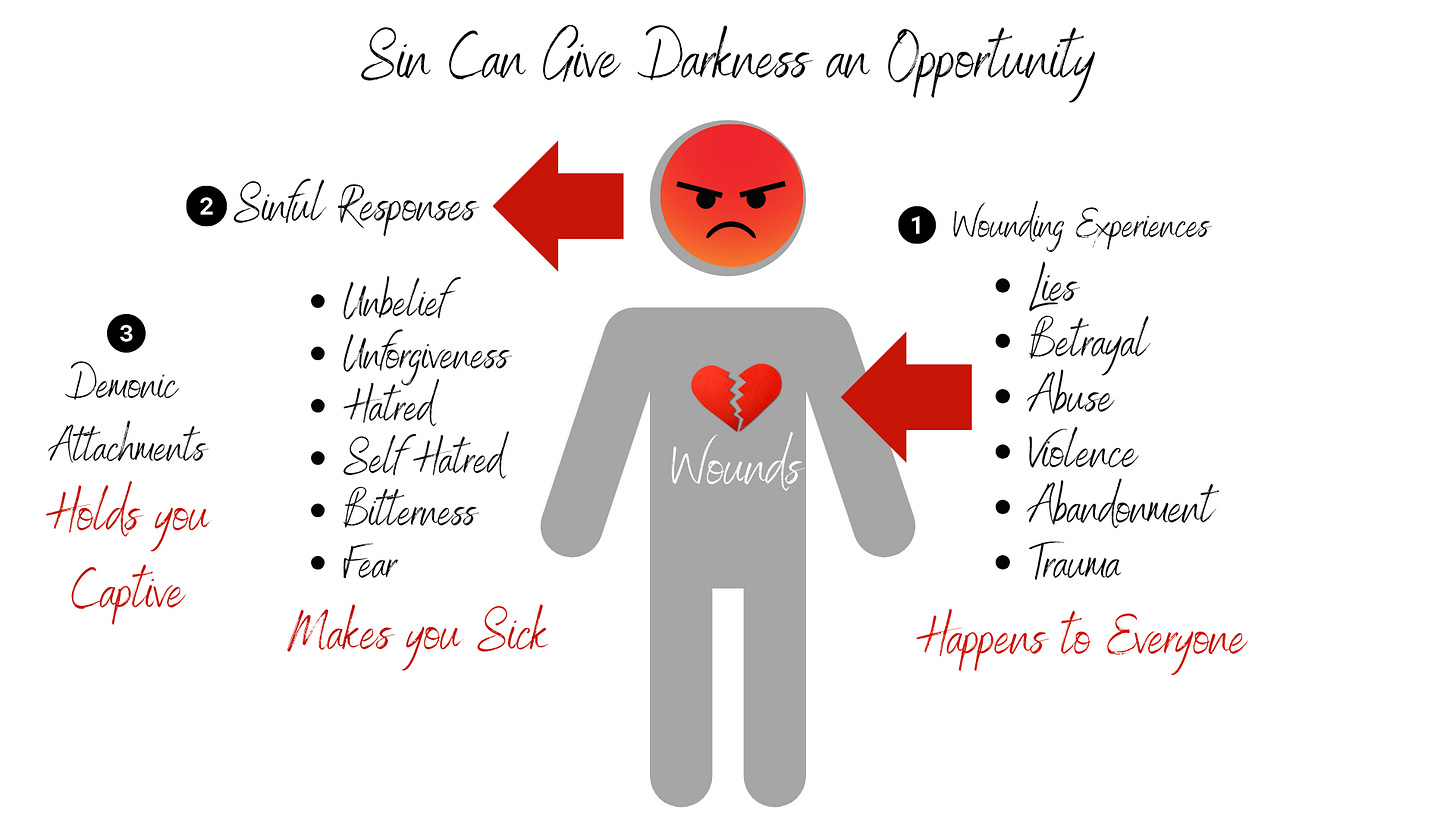Chapter 13
How We Ministry with Jesus as He Heals Wounded Hearts
Listen
Read
It is common for new followers of Jesus to experience significant and even radical transformation when they first experience God’s love and forgiveness. They report a profound new freedom as God’s love heals their hearts. Then over the course of time the Holy Spirit works deeper into the believer’s life as He leads them in the process of transformation into “the measure of the stature of the fullness of Christ” (Ephesians 4:13). The Holy Spirit works in the believer to deepen repentance and to rebuild his or her life as He purges inappropriate values, attitudes, and behaviors and rebuilds their character to be like Jesus’ own.
However, sometimes believers come up against brokenness and dysfunction that seems intractable. No amount of prayer, Bible study, or self-discipline proves sufficient to get past the persistent problems.
What follows is a brief introduction and overview of how we minister with Jesus as He heals those who follow Him from the lingering inner wounds that cripple, distort, and burden their lives.
Background of the problem
To understand how Jesus can fix what has gone wrong deep inside people, we need to begin with some idea of what a human would look like if he or she weren’t broken. According to the Bible, before sin entered the human situation, several wonderful things were “normal” for the first humans.
First, they were able to enjoy God’s love for them and to have an open and intimate relationship with Him.
Second, they were able to love each other with the same openness and freedom they experienced with their creator.
Third, their human capabilities and capacities for work, creativity, enjoyment, and purposeful existence were unhindered. There was nothing keeping them from fulfilling God’s purpose for them on earth. Humans were created as God’s Image with a unique and special role to play in God’s world. In fact, by God’s design, the entire world depended on the loving, wise, and careful stewardship of God’s delegated representatives who had the authority, responsibility, and power to manage His purposes on the earth.
But there is a problem; something has gone terribly wrong. It is not now normal for humans to have an open and intimate relationship with God or with other people. We struggle with internal obstacles that prevent us from living lives of God-given purpose and significance. Often, the story of humanity devolves into self-destruction and corruption of everything around us.
The Root Cause of the Problem
The Bible is clear about the root cause. Everything changed with the introduction of Sin and Death when the first humans chose to turn away from the love of their Creator. The sad story in Genesis describes how they did not trust God enough to obey Him in all things. They listened to the serpent’s lie that God could not be trusted. He insinuated that the boundaries God gave them were intended to limit their lives rather than protect them from harm and ensure that they were able to live abundant and wonderful lives. Thus, they turned away from the truth about God and followed the lie and the liar. They embraced sin and its inevitable consequences, corruption, and death.
We have all followed their example. James, Jesus’ brother explained it like this:
“But each person is tempted when he is lured and enticed by his own desire. Then desire when it has conceived gives birth to sin, and sin when it is fully grown brings forth death.” James 1:14–15
Paul described this common dynamic of sin and death that is the universal experience of all humans.
“Now the works of the flesh are evident: sexual immorality, impurity, sensuality, idolatry, sorcery, enmity, strife, jealousy, fits of anger, rivalries, dissensions, divisions, envy, drunkenness, orgies, and things like these. I warn you, as I warned you before, that those who do such things will not inherit the kingdom of God.” Galatians 5:19–21
Paul’s warning that those who do these things will not inherit the kingdom of God is not saying God is vindictive and withholds the goodies from those who do not play by his rules. To inherit the kingdom of God means to be restored to the life that humans were created to live as those who bear God’s image and administrate His kingdom purposes on earth. When broken people inherit the kingdom of God, they are enabled to enjoy the full rights and privileges of those who know God and are loved by him and are free from the brokenness and corruption that entered the world.
The consequence of sin is the problem that has plagued humanity since Adam and Eve followed the liar rather than trusting the loving wisdom of the creator. Common human experience is pain and sickness in bodies which ultimately fail and die. Humans also suffer from pain and dysfunction on the inside. They are twisted and distorted by the wounding of sin, and sometimes the torment and manipulation of evil spirits.
The Creator’s Solution to the Problem
The Bible is also clear about what God has done to resolve the problem of sin and its consequences. Jesus, the Son of God and the Second Adam, was Himself the Sovereign Creator’s grace and love in action sent to resolve what we humans could not do for ourselves.
Being fully human, Jesus, like the first Adam, was the image of God. His life as an image bearer showed us what human life looks like when it is free from the disaster of sin and death. In the human life of Jesus, we see a human enjoying an intimate and loving relationship with God and with others. We also see God-given human purpose as He worked with His father to manage God’s purposes on earth as in heaven. Jesus collaborated with the Father to rescue people out of the pain and chaos that has infected God’s good world. He spoke to people so they could hear and respond to what God was saying to them. He also healed them of the physical, emotional, and spiritual damage they had suffered in their lives.
Jesus was also fully God. He decisively resolved the universal problem of Sin and Death created by the first human’s rebellion and idolatry. He achieved for us forgiveness and reconciliation with our creator through His death, burial, and resurrection. The Bible says that,
“For as by the one man’s disobedience the many were made sinners, so by the one man’s obedience the many will be made righteous.” Romans 5:19
As a disciple of Jesus himself, Paul understood that his own responsibility to “fulfill the ministry that Jesus began” included helping others experience the life transforming power of Jesus’ rescue. Jesus commissioned Paul to do this when He said,
“…I am sending you that they may turn from darkness to light and from the power of Satan to God, that they may receive forgiveness of sins and a place among those who are sanctified by faith in me.” Acts 26:17,18
The Implementation of God’s Solution Today
This brings us to our experience with the Father as disciples of Jesus. Those who receive Jesus and believe in His name are adopted by God the Father as His own children. His Holy Spirit comes into our lives so we can live the life Jesus lived and fulfill the mission Jesus began. Jesus came to rescue humanity from sin and death, to put God’s good creation in order, and restore humans to our intended place with Him.
Only God himself could make it possible for humans to live and function again as his image in the Earth. This is what Jesus meant when He talked to Nicodemus about the need to be born again. Jesus rescues people out of the brokenness and darkness of sin and death to restore them to who God created them to be and to live the lives they were intended to live.
Those who God rescues are transformed by three powerful works of the Holy Spirit when He comes into our lives. The power of the Spirit brings to bear the forgiveness, healing, and deliverance from the powers of darkness, sin, and death which Jesus secured through His cross and resurrection. For over 2000 years, the transformation of those who encounter Jesus and trust Him for their rescue is stunning. People who know them often marvel that God’s power can change people so radically.
However, some of those who have become followers of Jesus still struggle to live abundant, wonderful lives. They continue to be crippled by fear, anger, compulsions, resentments, and hatred. Is this evidence that the salvation Jesus brings is not as great as we thought it was? Is He incapable of truly rescuing those who trust him from all the consequences of sin and death that inevitably follows?
The issue is not that Jesus’ power to save is inadequate, but that the process of forgiveness, healing and deliverance is incomplete. Our transformation in Jesus doesn’t happen all at once, like waving a magic wand. it’s important to recognize that the Bible says our experience will be one of a process. For example,
“Now this I say and testify in the Lord, that you must no longer walk as the Gentiles do, in the futility of their minds. They are darkened in their understanding, alienated from the life of God because of the ignorance that is in them, due to their hardness of heart. They have become callous and have given themselves up to sensuality, greedy to practice every kind of impurity. But that is not the way you learned Christ!— assuming that you have heard about him and were taught in him, as the truth is in Jesus, to put off your old self, which belongs to your former manner of life and is corrupt through deceitful desires, and to be renewed in the spirit of your minds, and to put on the new self, created after the likeness of God in true righteousness and holiness. Ephesians 4:17–24
What Paul wrote to the followers of Jesus in Ephesus only makes sense if the work of putting off the old self and putting on the new was not completed in an instant. Sometimes hidden deep inside there is lingering corruption and brokenness that still needs to be addressed by the forgiveness, healing, and deliverance Jesus provides. From the very beginning of the church, the ongoing need to work with the Holy Spirit in this process of inner transformation has been central to making disciples.
It is true that we are called to minister with Jesus as He heals bodies from the effects of life in a broken world. But our mission is also to assist Him in the work of restoring the inner lives of our brothers and sisters with the power of His forgiveness, healing, and deliverance.
Ministry with Jesus to Heal the Deep, Intractable Wounds of the Inner Person
We are ready to explore how we minister with Jesus as He works deep within the hearts and minds of those who receive Him and believe in His name. In what follows we will explore first how the deep wounding of the soul occurs in a person, and then what it is that Jesus does that brings healing and freedom. When we understand both how the wounds are formed and how Jesus heals them, we will then be able to follow the lead of the Holy Spirit and assist in the process as we minister to others with Jesus.
Where Do Deep Wounds and Dysfunction Come From?
The world we live in, as we have described it so far, is a world that is broken. Universal human experience is one of joy and happiness mixed with pain and destruction. So, the first thing we observe is that everyone experiences hurt and wounding to their inner person. At one time or another we are all hurt when we are lied to, abused, betrayed, disappointed, abandoned, or experience any number of distinct types of traumas.
We can also observe that two different people may experience nearly identical traumas and yet turn out so differently. One will go through the experience and yet become a relatively whole and functional person, while another will be deeply wounded and broken and suffer for the rest of their life. What accounts for the difference in outcomes?
Very different outcomes from similar trauma are tied to how one responds to the wounding experience. Long lasting effects from hurtful experiences can be compared to physical wounds in the body that don’t heal properly. Many times, an injury to your body responds to the body’s healing processes and over time is resolved with nothing left but a scar or a memory of the incident. But if infection is introduced everything gets worse not better. Rather than returning to normal, an infected wound continues to cause pain and can adversely impact health in other areas of the body. In the case of wounds to the inner person the poison introduced into the wound is our sinful response.
Sin can be compared to poison or malignancy in the soul that infects the wounds in our hearts. Our sinful responses to wounding experiences bind the pain we felt to the memory of the hurtful event and causes it to fester and persist. We respond sinfully because like Adam and Eve, we do not trust in the wisdom and love of God for us and react in ways that are self-destructive and against the creator’s good for us. These sinful reactions include fear, bitterness, unbelief, and hatred. In the end, we carry around deeply buried and persistent sources of hurt that flare up in anxiety, addiction, irrational fears, compulsion, rage, and more. These inner wounds in the soul can also generate illness in the body.
To make matters worse, these infected inner wounds make us vulnerable to spiritual powers that take advantage of us like they did when Adam and Eve first opened the door to sin. Quickly, the enemy rushed in to gain a foothold in humanity and to twist and distort God’s good creation. In the same way, our deep inner wounds, infected by our sinful responses, can become avenues for the enemy to gain leverage in our lives, and to wreak havoc.
How Does Jesus Heal the Wounded Inner Person?
The point we have made so far is that persistent wounds, pain, and other dysfunctions are not evidence that the salvation Jesus brings is inadequate. Rather, they are evidence of an incomplete work that still needs to penetrate the individual's inner heart.
Earlier, we said God’s rescue through Jesus involves three powerful works of the Holy Spirit: forgiveness, healing, and deliverance from the powers of darkness. Jesus restores broken people by applying these three works to the deep, hidden wounds in their hearts.
To be clear, we are not talking about some version of religious self-help principles for optimal mental wellness distilled from the ancient esoteric writings of an Eastern philosophy preserved in the pages of a very old book. We are talking about Jesus, who healed the sick and set people free in the first century and continues to do so to this day as his spirit fills and works through those who follow him as his disciples.
How does Jesus heal the wounded inner person? First, He addresses the root problem that holds the pain in a person’s heart, pain that can lead to a myriad of ongoing problems and dysfunctions in life. He gently and lovingly helps the person face the truth about their sinful response and then grants grace and faith to repent, turn away from their sin, and turn back to the love and safety of God to receive forgiveness.
Next, He begins lovingly healing the wounds and removing the pain connected to the memory of the hurtful experience.
Finally, suppose the enemy has found any place of influence and control due to the sinful response to the hurt. Jesus drives it out in that case, freeing the person from harassment and manipulation.
What we’ve just described is a part of the ongoing process of following Jesus as his disciples. This deep work of healing and transformation is needed for us to be formed into the image of Jesus, whereby we put off the old man and put on the new, becoming like Christ in every way. However, the pain can be so deep and hidden that we can’t make much progress without the direct intervention and assistance of other brothers and sisters as they minister to us with Jesus.
How Do We Minister with Jesus as He Heals Wounded Hearts?
Let’s begin this final section by addressing an understandable but unhelpful misconception about what it takes to minister healing to other people. Our Western culture has intentionally excluded God from consideration and replaced him with the self-sufficient, autonomous individual. We have been conditioned to look to ourselves for whatever is needed or required to complete the job. Therefore, our automatic stance when we attempt to help another person in pain is to step up and come to their aid with whatever knowledge, expertise, or compassion we possess.
We don’t disparage human knowledge, expertise, or compassion; we want to be clear that those are insufficient to heal the wounded inner person. Jesus is, from first to last, the love and power of God rescuing fallen, broken people. He alone is the one who restores people to their relationship with the creator and to the lives they were created to live.
When we minister healing to another person, we serve as Jesus’ assistants. We are not on our own doing things for God, who is “up there in Heaven.” In truth, we are totally dependent upon Jesus’ spirit as He involves us in His continuing work of kingdom rescue. While our knowledge, expertise, and compassion are useful to Jesus as we assist Him in ministry, the more essential skills we need to have include hearing from God, facilitating the process of forgiveness, and discerning spirits.
Imagine yourself in a ministry situation with another person. Together, you are sitting in Jesus' presence, and his spirit is there. As you pray, you are looking to Jesus to learn what the Father wants to do for this person with you. You ask the Holy Spirit to guide you and show you how to proceed. As you listen to the spirit and follow Him, you may find yourself led to assist Jesus in the following ways:
You may assist in identifying where the wounds and source of the pain are to be found. This may be through revelation or by asking the person questions as the spirit leads you.
You may find that you need to assist in identifying the actual sinful response that resulted in the wound becoming an ongoing problem. Again, this may be by revelation or through interaction with the person. The goal is not just to manually sort through our knowledge of causes and effects but to hear from the spirit as He directs attention to what God knows is the real issue.
You may also find that the person you’re praying with needs your help and encouragement to work through the process of repentance for the sinful thought, action, or attitude they are coming to recognize as the real root cause of this problem. Then, they may need help receiving forgiveness and perhaps giving forgiveness to others who have hurt them.
When we work with Jesus to heal physical issues in a person’s body, Jesus may direct us in what to say to release the power of His love to heal the wounded areas of the heart. Likewise, if the Lord has identified demonic attachments, we may assist the person in renunciating them and telling them to leave.
Conclusion
There are several ideas and convictions I want you to take away from this chapter.
First, the deep and seemingly intractable wounds and brokenness that lingers even in the lives of those who are seeking to follow Jesus are not signs that the gospel of the Kingdom and the power of God are not the good of news we had hoped. Don’t give up hope on yourself or others. Jesus’ promise of forgiveness, healing, and deliverance are not voided by the presence of persistent inner wounds and pain. Instead, what is needed is for the transforming work that began when Jesus first came into one’s life to be allowed to go deeper. Fear and shame cause many to hide and turn away from the healing grace of Jesus’ presence, but that is not the way to transformation and freedom.
Second, the deep application of forgiveness, healing, and deliverance Jesus wishes to do is done best in the context of the interdependence and interconnectedness of His body. Jesus’ way is to use us to be His voice and His hands, cooperating with His spirit as He lovingly helps us move through the wonderful, though sometimes painful process, of becoming confirmed to His image.
Here are some questions for consideration and discussion.
A basic premise of chapter 13 is that even though powerful changes often occur when an individual gives their life to Christ (becomes a Christian, accepts Jesus as savior, becomes born again, or whatever way you prefer to label the experience), “sometimes, believers encounter brokenness and dysfunction that seem intractable. No amount of prayer, Bible study, or self-discipline proves sufficient to overcome the persistent problems.” Have you observed or experienced this and seen Jesus breakthrough in some way with healing, forgiveness, or deliverance? How does this affect you as you think about helping others find healing, forgiveness, or freedom?
What is your reaction to the idea that the most damaging and persistent reason for ongoing pain and dysfunction is not so much the hurtful things that we experience but the sinful ways we respond?
Which idea(s) from this chapter are most challenging, and why?
Chapter 13 Daily Scripture Readings
How to spend some quality time listening to what Jesus would like to say through the scriptures:
In preparation, acknowledge the Lord’s presence and love for you and settle yourself before Him (in your mind and heart).
Read the day’s text carefully; take your time.
Reflect on what you have been reading with a listening ear – what word, phrase, or sentence speaks to you from the text?
Now, talk to the LORD about what you hear from this text. What has Jesus stirred in your heart?
If you were with Him walking from one Galilean village to another, what would you say to Him about this?
Mark 15:16-20
Mark 15:21-32
Mark 15:33-41
Mark 15:42-47
Mark 16
Recommended Reading
Street Level Healing, Todd Volker [available on Amazon]
Two Hours to Freedom, Charles Kraft [available on Amazon]
There are two ways you can go deeper with this material, if you are finding this helpful.
First, read How to get the most from this book. I offer some suggestions about how to do more than skim the pages and move on with minimal impact.
Second, read How to use this book with a small group. This material was formed and proven in a small group setting that has been very effective at helping participants engage with Jesus at a much deeper and transformative level than is typical in our churches today.










nice post